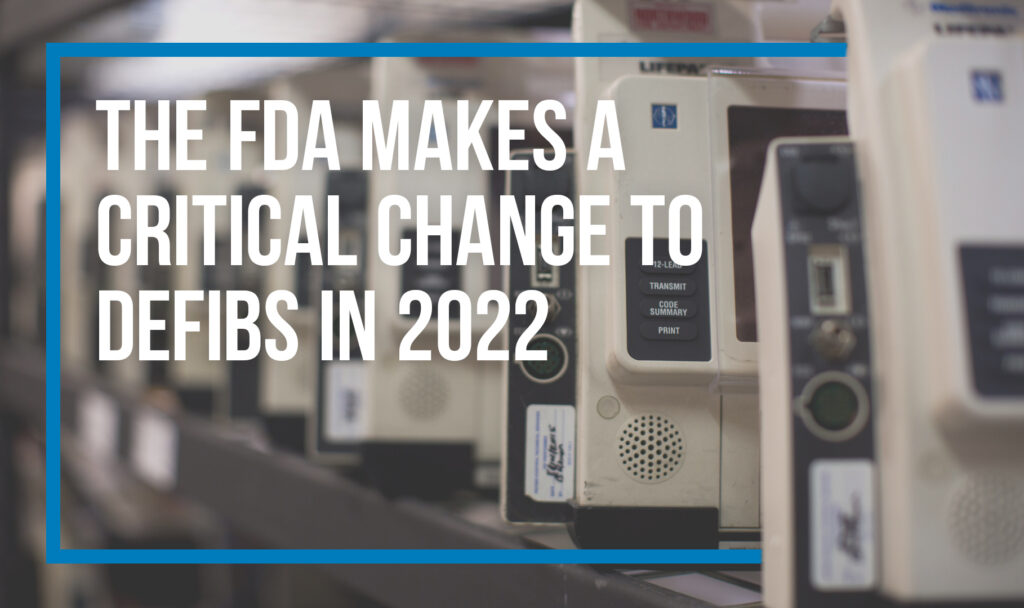Blog
The FDA Makes a Critical Change to AEDs in 2022

Repost of an article originally published in TechNation, Expert Advice
At MME and ReNew Biomedical, we want to keep our customers up-to-date and informed on any FDA regulatory actions that will cause issues or problems within their course of business. One of the most comprehensive actions taken by the FDA is the institution of the Pre-Market Authorization (PMA) requirements that will directly affect all automated external defibrillators (AEDs) and AED capable devices in the market. As a nationwide leader in the sales and service of AEDs and AED capable ALS defibrillators, we would like to help educate and inform those end-users in our industry who will be dealing with the financial and operational issues caused by this action.
In an effort to make AEDs and AED capable devices more reliable, the FDA made a final order in February 2015 (Section 515(b)(1)(A) of the FD&C Act (21 U.S.C. 360e(b)) stating that current and future devices with an AED function would have to go through the more robust PMA process to carry the FDA’s approval. Not only does this include AED defibrillators for public access but also any ALS defibrillator in professional settings with AED or analyze functions. There are thousands of defibrillators currently located in hospitals, surgery centers and EMS organizations around the country that will be the affected. This FDA-mandated PMA process is very similar to what pharmaceuticals must go through to get approval for use in the U.S.
Previous to 2015, the FDA allowed these Class 2 devices to go through a less rigorous process called the 510k approval, which is still required in addition to PMA. The new processes are time-consuming, expensive and have caused manufacturers such as Zoll, Stryker/Physio Control, Cardiac Science and Philips Medical (not to mention other makers of existing devices and/or accessories) to evaluate whether or not to pursue the PMA for older products that they do not expect to manufacture or support any longer.
In an official letter in September of 2019, the FDA designated February 3, 2022 as the last date for manufacturers of any new-to-market AED products or previously manufactured AED products to be PMA-approved in order to be sold in the U.S. medical marketplace. Furthermore, if a PMA is not filed by February 3, 2022, manufacturers must also cease marketing non-conformed accessories as of February 3, 2022.
Device OEMs are not the only ones required to submit to this PMA ruling. Aftermarket manufacturers of all necessary AED and defibrillator accessories such as batteries, pad electrodes, adapters and other patient hardware must file a PMA. As a result, if an AED or AED capable device is not PMA approved, no accessory, part or supplies can be manufactured or marketed after February 2022.
What does this mean for the thousands of AEDs and AED capable ALS devices that are not PMA-FDA compliant? Contrary to some rumors, all previous 510k approved devices have been “grandfathered” in and are still usable as intended until the needed parts or accessories are no longer available in 2021. Most of these devices, which have already been discontinued by the OEMs, were at the end of their life cycle.
At MME and ReNew Biomedical, we are advising our customers to make plans to replace their units as budget permits in the next 4 to 8 months. We will be able to support some of these devices for an additional period past February 3, 2022, but the duration depends on availability of vital components and the date the manufacturers cease to produce them (specifically defibrillation electrodes and batteries, which most manufacturers are already phasing out). Available support could be as little as 12 to 24 months, but there are no guarantees of compatible parts after February 2021, as we are expecting some customers to back-stock their needed parts and accessories as that date approaches.
As a reminder, AED and defibrillator pads have an expiration of 24-36 months. However, if they are opened or used there will be no replacement. Similarly, most batteries will last 2-4 years, but once they are dead there will be no replacements available. As a seller of recertified AEDs and ALS devices, we are also seeing a strong demand for used PMA-approved devices. Most of our customers had not budgeted for purchasing or replacing their existing equipment at the time of this FDA mandate and are currently searching for a cost-effective solution other than buying new units.
As an ISO 9001:2015 certified equipment company, we feel it is part of our duty to inform our customers and the market we serve about vital information to assist stakeholders in making the best decision on equipment before they make a critical mistake that can cost them their entire budget. We see our role in the replacement of non-PMA FDA approved devices as vital to our mission to provide the best service and highest quality equipment to our customers. For more information for sales of PMA FDA cleared units, call our sales team at MME, or for questions on the service life of existing non-PMA compliant devices, reach out to our ReNew Biomedical team. As always, we are prepared to help guide you if you need assistance.

Mark Taylor Owner/President of MME and ReNew Biomedical
Originally Published in TechNation, Expert Advice, Feb 2021
Editor’s note: Article’s original dates have been updated to reflect the FDA’s 1-year pushback of the original deadline due to the COVID pandemic.
